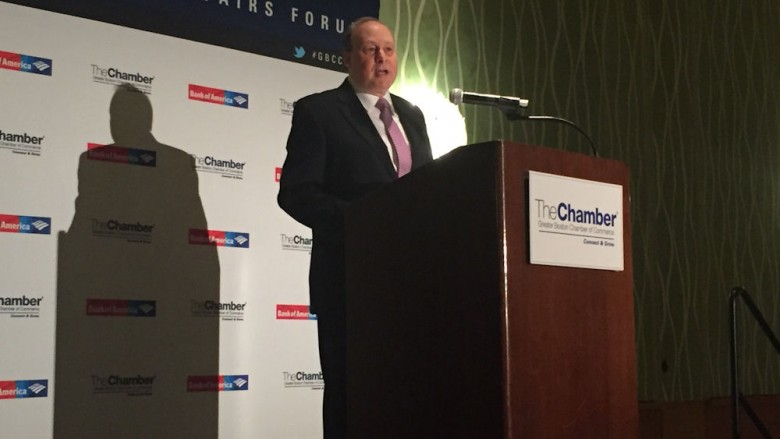Rosenberg plans May or June debate on ‘bathroom bill’
By State House News Service | April 13, 2016, 14:02 EDT
 Massachusetts Senate President Stanley Rosenberg plans to bring the bill on transgender people’s access to public facilities forward for debate in the upper chamber in May or June. (State House News Service photo by Antonio Caban)
Massachusetts Senate President Stanley Rosenberg plans to bring the bill on transgender people’s access to public facilities forward for debate in the upper chamber in May or June. (State House News Service photo by Antonio Caban) BOSTON – Massachusetts Senate President Stanley Rosenberg told a business group Wednesday that he plans to bring forward for debate in the upper chamber a measure dealing with transgender people’s access to public restrooms, locker rooms and other facilities.
The controversial “bathroom bill,” as it is often called, has languished in the Judiciary Committee for most of the 2015-2016 legislative session. The measure (H 1577/ S 735) would give transgender people the right to use the public facilities of their choice rather than their sexual anatomy.
Critics of the measure say it may put girls and women at risk, raising the specter of males masquerading as transgender females to gain access to the girls’ bathrooms and locker rooms, and represents a threat to privacy. Under an extension granted last month, the Judiciary Committee has until May 2 to take action on the measure.
Similar debates have percolated in statehouses around the country recently. North Carolina Gov. Pat McCrory, a Republican, came under fire after he signed a law repealing local statutes granting access to public facilities based on perceived sexual identity rather than physical gender. Lawmakers in Tennessee are being pressured by business groups and advocates for homosexuals and transgender people to reject a bill requiring public facility use according to gender at birth, according to the Associated Press.
Rosenberg, an Amherst Democrat, told the Greater Boston Chamber of Commerce that he expects the Senate to debate the issue “probably in May, at worst in early June.”
Speaker Robert DeLeo, a Winthrop Democrat who like Rosenberg supports the bill, has been surveying members of the House of Representatives to discern whether a possible veto from Gov. Charlie Baker, a Republican, could be overridden before deciding whether to bring the bill to a vote.
Campaigning for governor in 2010, Baker said he would veto a previous version of the measure. As governor, he has steadfastly refused to say how he would handle the bill should it pass the legislature and reach his desk.
In the first year under James Rooney, the group’s chief executive, the Chamber has been more vocal with its views on policies being debated on Beacon Hill and has been willing to break ranks with other business advocacy organizations on hot-button issues. It has voiced support for the bathroom bill, joining companies like Google, Harvard Pilgrim Health Care and Eastern Bank.
“Fairness and equality are essential to good business in Massachusetts,” Rooney said in a statement last September. “As an association with a wide-range of business members, we can’t emphasize enough how vital it is to our state’s business climate and economy that we support inclusivity and provide clear legal protections for all.”
The support of the Chamber, influential companies in the region and Boston’s major sports franchises, Rosenberg said, shows that passing the bill into law is “the right thing to do.”
“If so many employers and so many business here and elsewhere, including our newest most welcome new addition to the Boston business landscape, GE, can endorse public accommodations and stand against discrimination, you know it’s the right thing to do,” he said at the Chamber event Wednesday.
Rosenberg also touched on the ways state government and the business community can do more together to advance common goals like improving public transit and developing highly skilled workers.
Rosenberg stressed the importance of both business and government looking out for the middle class and dealing with income inequality in Massachusetts.
“To have a world-class middle class, we have to see the economic systems respond to the needs of those families,” he said. “If we’re going to move forward and we’re going to bring this commonwealth up to where it needs to be in terms of providing a living wage and having our families be supported …we have to address the wealth gap and wage inequality within our system.”
Rosenberg said Senate leaders have discussed three variations of a bill that would boost the minimum wage to $15 per hour for certain workers, and he again promoted a proposed constitutional amendment adding a 4 percent surtax on incomes above $1 million as a means for increasing investments for public transportation and education.
Written by Colin A. Young









